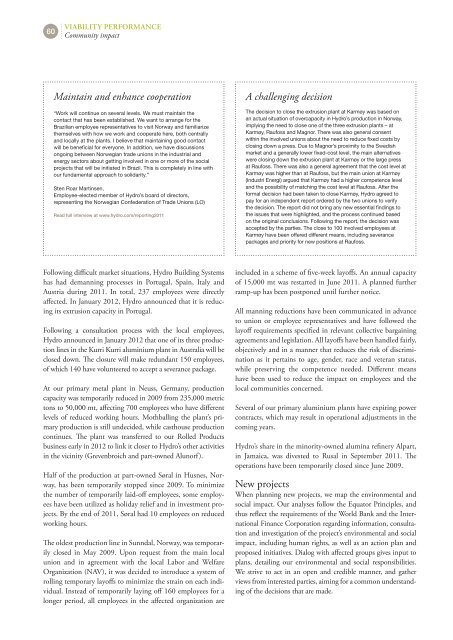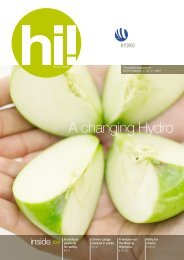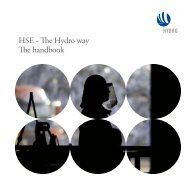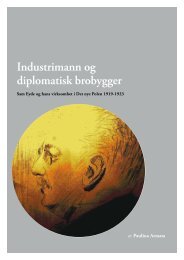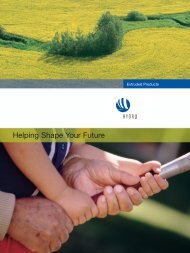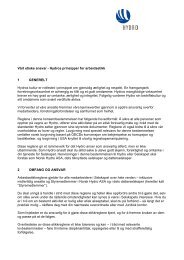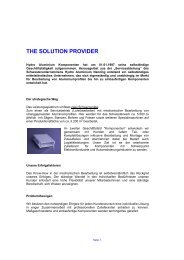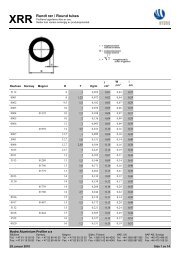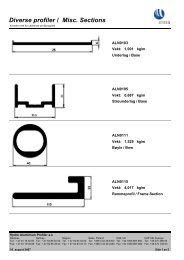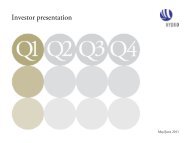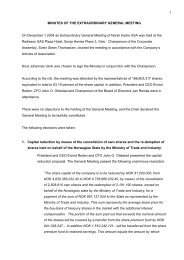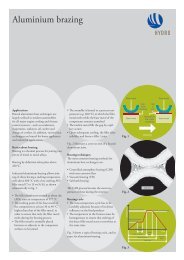Hydro Annual Report 2011b
Hydro Annual Report 2011b
Hydro Annual Report 2011b
You also want an ePaper? Increase the reach of your titles
YUMPU automatically turns print PDFs into web optimized ePapers that Google loves.
60<br />
vIABIlItY perForMAnCe<br />
Community impact<br />
Maintain and enhance cooperation<br />
“Work will continue on several levels. We must maintain the<br />
contact that has been established. We want to arrange for the<br />
Brazilian employee representatives to visit Norway and familiarize<br />
themselves with how we work and cooperate here, both centrally<br />
and locally at the plants. I believe that maintaining good contact<br />
will be beneficial for everyone. In addition, we have discussions<br />
ongoing between Norwegian trade unions in the industrial and<br />
energy sectors about getting involved in one or more of the social<br />
projects that will be initiated in Brazil. This is completely in line with<br />
our fundamental approach to solidarity.”<br />
Sten Roar Martinsen,<br />
Employee-elected member of <strong>Hydro</strong>’s board of directors,<br />
representing the Norwegian Confederation of Trade Unions (LO)<br />
Read full interview at www.hydro.com/reporting2011<br />
following difficult market situations, <strong>Hydro</strong> Building Systems<br />
has had demanning processes in Portugal, Spain, Italy and<br />
Austria during 2011. In total, 237 employees were directly<br />
affected. In January 2012, <strong>Hydro</strong> announced that it is reducing<br />
its extrusion capacity in Portugal.<br />
following a consultation process with the local employees,<br />
<strong>Hydro</strong> announced in January 2012 that one of its three production<br />
lines in the Kurri Kurri aluminium plant in Australia will be<br />
closed down. The closure will make redundant 150 employees,<br />
of which 140 have volunteered to accept a severance package.<br />
At our primary metal plant in Neuss, Germany, production<br />
capacity was temporarily reduced in 2009 from 235,000 metric<br />
tons to 50,000 mt, affecting 700 employees who have different<br />
levels of reduced working hours. Mothballing the plant’s primary<br />
production is still undecided, while casthouse production<br />
continues. The plant was transferred to our Rolled Products<br />
business early in 2012 to link it closer to <strong>Hydro</strong>’s other activities<br />
in the vicinity (Grevenbroich and part-owned Alunorf).<br />
Half of the production at part-owned Søral in Husnes, Norway,<br />
has been temporarily stopped since 2009. To minimize<br />
the number of temporarily laid-off employees, some employees<br />
have been utilized as holiday relief and in investment projects.<br />
By the end of 2011, Søral had 10 employees on reduced<br />
working hours.<br />
The oldest production line in Sunndal, Norway, was temporarily<br />
closed in May 2009. Upon request from the main local<br />
union and in agreement with the local Labor and Welfare<br />
Organization (NAv), it was decided to introduce a system of<br />
rolling temporary layoffs to minimize the strain on each individual.<br />
Instead of temporarily laying off 160 employees for a<br />
longer period, all employees in the affected organization are<br />
A challenging decision<br />
The decision to close the extrusion plant at Karmøy was based on<br />
an actual situation of overcapacity in <strong>Hydro</strong>’s production in Norway,<br />
implying the need to close one of the three extrusion plants – at<br />
Karmøy, Raufoss and Magnor. There was also general consent<br />
within the involved unions about the need to reduce fixed costs by<br />
closing down a press. Due to Magnor’s proximity to the Swedish<br />
market and a generally lower fixed-cost level, the main alternatives<br />
were closing down the extrusion plant at Karmøy or the large press<br />
at Raufoss. There was also a general agreement that the cost level at<br />
Karmøy was higher than at Raufoss, but the main union at Karmøy<br />
(Industri Energi) argued that Karmøy had a higher competence level<br />
and the possibility of matching the cost level at Raufoss. After the<br />
formal decision had been taken to close Karmøy, <strong>Hydro</strong> agreed to<br />
pay for an independent report ordered by the two unions to verify<br />
the decision. The report did not bring any new essential findings to<br />
the issues that were highlighted, and the process continued based<br />
on the original conclusions. Following the report, the decision was<br />
accepted by the parties. The close to 100 involved employees at<br />
Karmøy have been offered different means, including severance<br />
packages and priority for new positions at Raufoss.<br />
included in a scheme of five-week layoffs. An annual capacity<br />
of 15,000 mt was restarted in June 2011. A planned further<br />
ramp-up has been postponed until further notice.<br />
All manning reductions have been communicated in advance<br />
to union or employee representatives and have followed the<br />
layoff requirements specified in relevant collective bargaining<br />
agreements and legislation. All layoffs have been handled fairly,<br />
objectively and in a manner that reduces the risk of discrimination<br />
as it pertains to age, gender, race and veteran status,<br />
while preserving the competence needed. Different means<br />
have been used to reduce the impact on employees and the<br />
local communities concerned.<br />
Several of our primary aluminium plants have expiring power<br />
contracts, which may result in operational adjustments in the<br />
coming years.<br />
<strong>Hydro</strong>’s share in the minority-owned alumina refinery Alpart,<br />
in Jamaica, was divested to Rusal in September 2011. The<br />
operations have been temporarily closed since June 2009.<br />
New projects<br />
When planning new projects, we map the environmental and<br />
social impact. Our analyses follow the Equator Principles, and<br />
thus reflect the requirements of the World Bank and the International<br />
finance Corporation regarding information, consultation<br />
and investigation of the project’s environmental and social<br />
impact, including human rights, as well as an action plan and<br />
proposed initiatives. Dialog with affected groups gives input to<br />
plans, detailing our environmental and social responsibilities.<br />
We strive to act in an open and credible manner, and gather<br />
views from interested parties, aiming for a common understanding<br />
of the decisions that are made.


